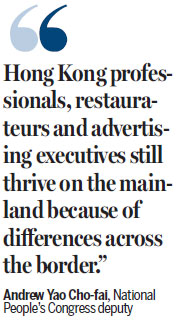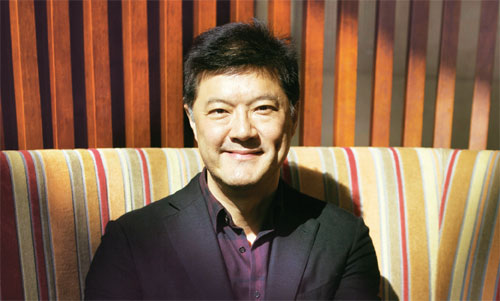Yao: Hong Kong still has unique role in the nation's development
Updated: 2016-03-11 08:13
By Kahon Chan(HK Edition)
|
|||||||||
NPC deputy and steel magnate says SAR's long experience of free market a major asset
As China emerges as a new world power, National People's Congress (NPC) deputy Andrew Yao Cho-fai assured the people of Hong Kong they still have a unique role to play in and out of the country.
The premier's report on government work this year, alongside the draft development plan for 2016-2020, renewed support for Hong Kong and Macao to take advantage of their respective strengths. It said they should play a larger role in the country's economic development and its liberalization process.
Corporations and individuals from the mainland have lately flexed their economic muscle around the world with a buying spree of prime real estate and other acquisitions. But Yao, who runs a steel distribution and processing business, said Hong Kong's importance remained.
The national lawmaker has had first-hand experience. A dramatic hike in predicted local demand drove the Platts China Steel Sentiment Index to a record high this month.
That was after two years of domestic demand slump. Expectations for exports in the index remain flat at 51 out of 100.
Low inventory was cited by Platts as the main driver of the price rebound. Steel exports of China skyrocketed from just over 60 million metric tons in 2013 to over 100 last year.
According to Yao, state-owned steel dealers had struggled for a while to get rid of unsold stocks.
Yao's expertise and connections in the steel trade proved useful. "Our (mainland) trade companies work like export order clerks. They are clueless about how to find customers because they are used to years of a planned economy," he said. "And we Hong Kong people have mastered the trade."
As state-owned enterprises draw up plans to ride the wave of the country's Belt and Road Initiative, Yao advised Hong Kong's financial and professional services to engage with state players and also play a role. To seize this opportunity, the city has to know more about strategy.
"If you don't care, it surely is irrelevant to you. But if you do care, you will get to know it better. You may get involved and even develop further. Then you make gains from it," he said.
One of Yao's proposals addresses another area in which Hong Kong has much to offer.
To promote Shanghai-Hong Kong Stock Connect, he called for better corporate governance for companies listed in the Shanghai market and institutional investors' access to beneficial ownership.

Appointed as non-executive director by various mainland firms, Yao noticed a lot of room for improvement in terms of transparency and investors' awareness of rights between the two financial hubs. Boards of directors on the mainland, he said, are also not very aware of what shareholders want.
"Hong Kong companies disclose everything and leave investors to decide the next move. On the mainland they do nothing until the regulator says yes," he said, explaining the difference. He hopes overseas institutional investors brought in through the stock connect can help to change things.
Hong Kong professionals, restaurateurs and advertising executives still thrive on the mainland because of differences across the border. Hundreds of thousands of city residents are based in Shanghai and Beijing today, he said. This is despite intense local competition at every level.
Hong Kong residents' global vision still does well on the mainland, but Yao stressed individuals and businesses must stay in touch with the locals either in their workplaces or in the market. Hong Kong-style cafe restaurants on the mainland, for instance, offer Chinese New Year specialties pun choi - or "big bowl feast" - year-round, something that still baffles Yao.
Yao also said his first decade on the mainland was a story of failures and setbacks. He blamed this on his misunderstanding of the local community and state policies.
He has been running an internship program for local university students since 2007. This is to give star performers their first glimpse of workplaces in Shanghai with mentor follow-ups and even counseling support. His partners range from mobile application developers to marketing firms.
There have been similar exchange schemes for the city's university students in recent years. But Yao noticed some tours lack in support and give too much of a cultural shock. The cosmopolitan atmosphere of Shanghai is an easy starting point for curious Hong Kong youth.
"People called it the City of Glamour, as it radiates a charm. Students are usually excited upon arrival," he said.
|
National People's Congress deputy Andrew Yao Cho-fai expects Hong Kong to play a key role in the nation's development strategy. Roy Liu / China Daily |
(HK Edition 03/11/2016 page7)
